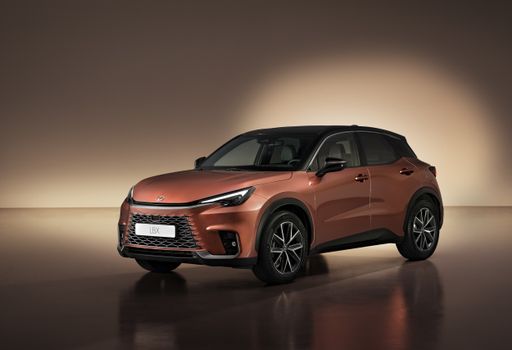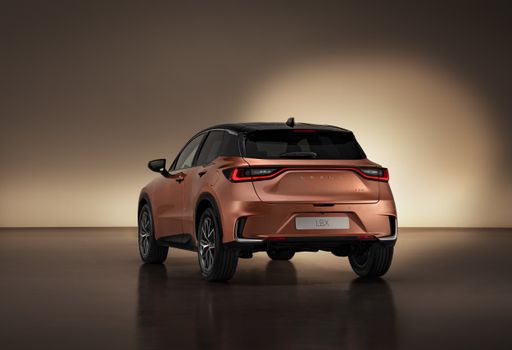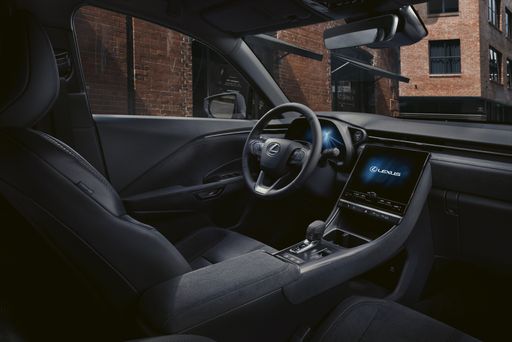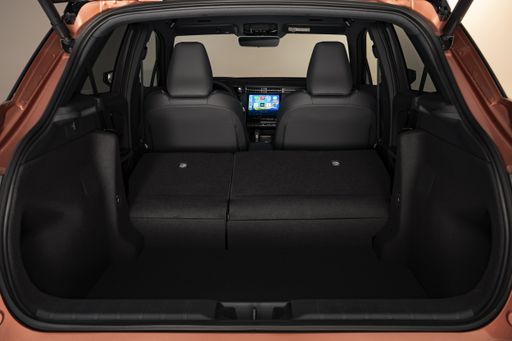Lexus LBX VS Toyota Yaris Cross
The Lexus LBX and Toyota Yaris Cross stand out in the increasingly competitive compact SUV segment, each offering a unique blend of luxury and practicality. While the LBX exudes a refined elegance with premium features and a more powerful hybrid drivetrain, the Yaris Cross appeals to budget-conscious buyers with its versatility and efficient performance. Ultimately, the choice between these two models boils down to whether you prioritize high-end comfort or value-driven functionality.
Lexus LBX
The Lexus LBX represents a new era of compact luxury crossovers, blending a sleek design with exceptional craftsmanship. This model offers an impressive balance of performance and comfort, making it an appealing option for urban driving and longer journeys alike. Inside, the cabin features high-quality materials and innovative technology, ensuring a driving experience that is both sophisticated and connected.
detailsToyota Yaris Cross
The Toyota Yaris Cross combines the practicality of a compact SUV with the agility of a smaller car, making it ideal for urban adventures. Its elevated seating position offers excellent visibility, while the stylish design ensures it stands out on the city streets. Inside, the Yaris Cross boasts a modern interior with advanced technology features designed to enhance the driving experience.
detailsWhen it comes to the expansion of the compact SUV segment, two models have captured the spotlight: the Lexus LBX and the Toyota Yaris Cross. Both vehicles showcase the benefits of hybrid technology and modern design, but they cater to slightly different markets. Let’s dive into the technical specifications and innovative features that set these two contenders apart in an increasingly competitive landscape.
Powertrain Performance: A Close Race
Both the Lexus LBX and the Toyota Yaris Cross are powered by 1.5-liter three-cylinder hybrid engines. The LBX produces a maximum output of 136 hp and can accelerate from 0 to 100 km/h in an impressive 9.2 seconds. On the other hand, the Yaris Cross offers two power outputs: 116 hp, with acceleration reaching 0-100 km/h in about 11.2 seconds, and a more potent 130 hp variant that achieves the same distance in 10.7 seconds.
Both vehicles feature an automatic CVT transmission, enhancing fuel efficiency. Notably, they show similar consumption figures, recorded at around 4.5 to 4.8 L/100 km, reflecting their eco-friendly intentions. The LBX does offer an all-wheel-drive option, providing a significant advantage for buyers in regions facing challenging weather conditions.
Design and Dimensions: Comfort Meets Style
When stepping into the cabin, the designs of the LBX and Yaris Cross offer distinct experiences. The LBX measures 4190 mm in length, 1825 mm in width, and 1560 mm in height, portraying a more upscale aesthetic that is typical of the Lexus brand. Inside, the capacity offers seating for four, enhanced by premium materials and finishing.
The Yaris Cross, with slightly smaller dimensions at 4180 mm long, 1765 mm wide, and 1595 mm high, provides a more spacious five-seater configuration. This difference in seating might sway consumers looking for practicality over luxury.
Interior Space and Practicality
Practicality is a focus for both models. The Yaris Cross boasts a generous trunk space of up to 397 liters, accommodating more gear for weekend getaways, while the LBX offers 332 liters. Despite the LBX's luxury branding, space might be a determining factor for buyers focused on multi-purpose use.
Additionally, the Yaris Cross features a payload capacity of up to 510 kg, surpassing the LBX’s 475 kg, which could be significant for those who need extra carrying capacity.
Eco-Friendliness and Efficiency
Both hybrids also promise low CO2 emissions, categorized under class C. The LBX emits between 102 to 109 g/km, while the Yaris Cross performs slightly better with figures ranging from 101 to 108 g/km. This eco-conscious engineering highlights the industry trend towards sustainability.
Technological Innovations and Safety Features
In terms of technological offerings, both the Lexus LBX and the Toyota Yaris Cross come equipped with advanced safety systems, including adaptive cruise control, lane-keeping assist, and collision mitigation systems. Lexus typically has the edge here, offering more luxurious tech features such as higher-grade infotainment systems, premium audio, and detailed driver assistance technologies provided in their safety suite.
Both vehicles are equipped with a central infotainment display, though the LBX’s system might offer a more sophisticated interface suitable for the luxury-oriented customer.
Conclusion: Which Model Reigns Supreme?
Ultimately, the choice between the Lexus LBX and the Toyota Yaris Cross boils down to individual preferences. The LBX offers a sportier and luxurious experience, while the Yaris Cross provides practicality and a spacious layout. Both models successfully deliver hybrid technology's benefits, paving the way for eco-friendly driving without compromising on performance or safety. As the automotive market continues to change, both Lexus and Toyota have placed themselves as formidable players in the compact SUV field, catering to diverse needs and tastes.
 @ newsroom.lexus.eu
@ newsroom.lexus.eu
 @ newsroom.lexus.eu
@ newsroom.lexus.eu
 @ newsroom.lexus.eu
@ newsroom.lexus.eu
 @ newsroom.lexus.eu
@ newsroom.lexus.eu
 @ Toyota
@ Toyota
 @ Toyota
@ Toyota
 @ Toyota
@ Toyota
 @ Toyota
@ Toyota
 @ Toyota
@ Toyota
 @ Toyota
@ Toyota
 @ Toyota
@ Toyota

|

|
|
|
|
Costs and Consumption |
|
|---|---|
|
Price
about 28300 - 39600
£
|
Price
about 24200 - 33900
£
|
|
Consumption L/100km
4.5 - 4.8
L
|
Consumption L/100km
4.5 - 4.8
L
|
|
Consumption kWh/100km
-
|
Consumption kWh/100km
-
|
|
Electric Range
-
|
Electric Range
-
|
|
Battery Capacity
-
|
Battery Capacity
-
|
|
co2
102 - 109
g/km
|
co2
101 - 108
g/km
|
|
Fuel tank capacity
36
L
|
Fuel tank capacity
36
L
|
Dimensions and Body |
|
|
Body Type
SUV
|
Body Type
SUV
|
|
Seats
4
|
Seats
5
|
|
Doors
5
|
Doors
5
|
|
Curb weight
1280 - 1365
kg
|
Curb weight
1180 - 1290
kg
|
|
Trunk capacity
255 - 332
L
|
Trunk capacity
320 - 397
L
|
|
Length
4190
mm
|
Length
4180
mm
|
|
Width
1825
mm
|
Width
1765
mm
|
|
Height
1560
mm
|
Height
1595
mm
|
|
Payload
455 - 475
kg
|
Payload
485 - 510
kg
|
Engine and Performance |
|
|
Engine Type
Full Hybrid
|
Engine Type
Full Hybrid
|
|
Transmission
Automatic
|
Transmission
Automatic
|
|
Transmission Detail
CVT
|
Transmission Detail
CVT
|
|
Drive Type
Front-Wheel Drive, All-Wheel Drive
|
Drive Type
Front-Wheel Drive
|
|
Power HP
136
HP
|
Power HP
116 - 130
HP
|
|
Acceleration 0-100km/h
9.2 - 9.6
s
|
Acceleration 0-100km/h
10.7 - 11.3
s
|
|
Max Speed
170
km/h
|
Max Speed
170
km/h
|
|
Torque
185
Nm
|
Torque
-
|
|
Number of Cylinders
3
|
Number of Cylinders
3
|
|
Power kW
100
kW
|
Power kW
85 - 96
kW
|
|
Engine capacity
1490
cm3
|
Engine capacity
1490
cm3
|
|
Top speed
170
km/h
|
Top speed
170
km/h
|
General |
|
|
Model Year
2024
|
Model Year
2024
|
|
CO2 Efficiency Class
C
|
CO2 Efficiency Class
C
|
|
Brand
Lexus
|
Brand
Toyota
|
Lexus LBX
Introducing the Lexus LBX: A New Age of Compact SUVs
The highly anticipated Lexus LBX has revolutionised the compact SUV market, delivering a perfect blend of luxury, efficiency, and performance. With a strong emphasis on hybrid technology, this new model sets a high standard for the environmentally conscious motorist while not compromising on style or innovation.
Under the Bonnet: Technical Mastery
The Lexus LBX is powered by an advanced full-hybrid drivetrain, with a capable engine that deftly combines efficiency and power. Its 1.5-litre, 3-cylinder engine is paired with a CVT automatic gearbox, producing a commendable 136 PS and 100 kW of power. This setup ensures smooth transitions and a seamless driving experience.
The choice between front-wheel and all-wheel drive ensures that drivers can tailor the LBX to their specific needs. The front-wheel drive variant boasts an impressive consumption rate of 4.5 L/100km, while the all-wheel drive models achieve 4.8 L/100km. With CO2 emissions ranging from 102 to 109 g/km, the LBX stands out as a sustainable choice in its class.
Performance and Efficiency
The Lexus LBX doesn’t just excel in fuel efficiency. Its performance statistics are noteworthy, with an acceleration of 0-100 km/h in just 9.2 to 9.6 seconds, and a top speed of 170 km/h. The hybrid system provides a combined torque of 185 Nm, delivering an energetic drive without compromising on environmental considerations.
Despite its compact design, the Lexus LBX offers a substantial boot space of 255 to 332 litres, making it ideal for everyday use and weekend escapades. The SUV's dimensions—measuring 4190 mm in length, 1825 mm in width, and 1560 mm in height—ensure it is suitably compact for urban driving while providing ample interior space.
Innovation in Design
Lexus pushes the boundaries of SUV design with the LBX by offering a modern and elegant aesthetic alongside its technical features. The model is available in several trim levels, including e-CVT, Elegant e-CVT, and the more dynamic Emotion E-FOUR e-CVT, each designed to cater to different tastes and preferences.
Interior features focus on comfort and connectivity, providing a plush environment with advanced infotainment options that seamlessly integrate with daily life. The LBX seats four comfortably, making use of high-quality materials that reflect the premium nature of the brand.
Price and Value Offering
The Lexus LBX comes with an accessible price range of €32,990 to €46,190, offering a luxurious entry into the world of hybrid SUVs. Considering its monthly operational costs ranging from €920 to €1,088, the LBX offers economical running alongside its ecological advantages, making it a smart choice for the discerning driver.
In conclusion, the Lexus LBX captures the essence of what a modern compact SUV should offer: performance, efficiency, and luxury all wrapped in a package that respects the environment. It is a noteworthy addition to the Lexus family, sure to capture the hearts of drivers everywhere.
Toyota Yaris Cross
Discovering the Toyota Yaris Cross: The Compact SUV Redefined
The Toyota Yaris Cross has boldly entered the compact SUV market, sporting a blend of sleek aesthetics, advanced hybrid technology, and practical functionality. As urban driving dynamics evolve, this vehicle meets the demands of modern motorists with an impressive performance and eco-friendly technology, setting itself apart in a bustling segment.
Performance and Efficiency: Hybrid Innovation at Its Best
The Yaris Cross is designed to provide an engaging driving experience combined with remarkable efficiency. At its heart lies a full hybrid powertrain, offering options between 116 PS and 130 PS, efficiently paired with Toyota's CVT automatic transmission. The hybrid system seamlessly integrates a petrol engine with an electric motor, optimising power delivery and responsiveness.
Drivers will appreciate the low fuel consumption, which ranges from 4.5 to 4.8 litres per 100 km, and equally impressive CO2 emissions of 101 to 108 g/km, aligning with the industry's ongoing commitment to sustainability.
Design and Dimensions: Compact Yet Spacious
The Yaris Cross offers a perfect blend of compact design and interior spaciousness, making it an ideal choice for urban environments. Measuring 4,180 mm in length, 1,765 mm in width, and 1,595 mm in height, the vehicle manages to provide a refined SUV stature without sacrificing manoeuvrability.
Its five-door layout and flexible boot space, ranging from 320 to 397 litres, make it practical for everything from city commutes to weekend getaways. The increased ride height adds to the SUV appeal, providing drivers with that coveted higher driving position and improved visibility.
Advanced Technology and Features
The Toyota Yaris Cross is well-equipped with an array of technological features, defined by its various trim levels including the Business Edition CVT, Comfort CVT, and the sporty GR Sport CVT. Each model is crafted to cater to diverse consumer needs, whether one prioritises enhanced comfort, sporty aesthetics, or comprehensive safety features.
Key innovations include a state-of-the-art infotainment system, advanced driver assistance features, and the Toyota Safety Sense package that enhances driver confidence through adaptive cruise control, lane keep assist, and more.
Driving Experience: Safety and Comfort in Focus
The Yaris Cross is not just about performance but also ensures safety and comfort for all occupants. The vehicle offers a smooth and quiet ride thanks to its refined suspension system and cleverly designed cabin, reducing noise and vibration levels.
The advanced safety suite within the Yaris Cross, encompassing multiple airbags, stability control, and a host of driver assistance systems, is designed to provide protection and peace of mind, every time you step into the driver's seat.
Conclusion: A New Benchmark in the Compact SUV Segment
The Toyota Yaris Cross stands as a testament to Toyota's commitment to producing environmentally friendly vehicles without compromising on performance or style. It strikes a harmonious balance between innovation, efficiency, and practicality, offering consumers a compact SUV that is both exciting to drive and easy to live with.
As we move further into an era of hybrid advancements and smarter automotive solutions, the Yaris Cross embodies these principles exceptionally, proving to be a robust and reliable partner for the modern driver.
